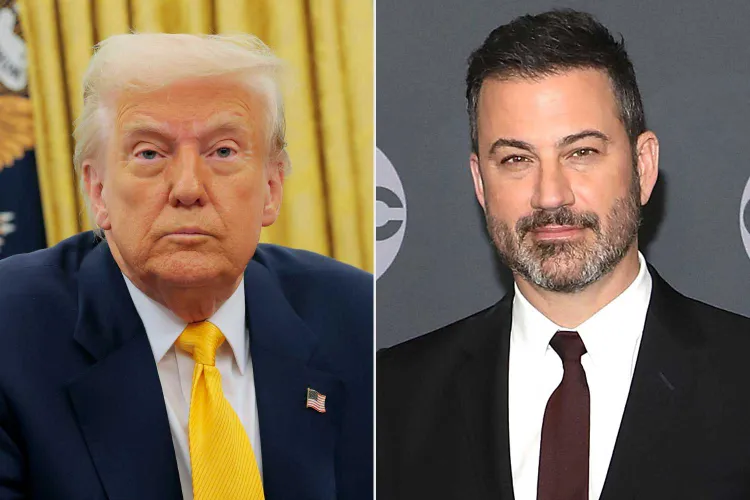WASHINGTON — President Donald Trump escalated his public criticisms of television networks Thursday, asserting that licensed broadcasters should be restricted from airing programming he perceives as hostile toward him. His remarks came a day after ABC indefinitely suspended Jimmy Kimmel Live! following controversial comments by the comedian regarding the recent death of Charlie Kirk.
Speaking to reporters aboard Air Force One on Sept. 18, Trump claimed that networks are overwhelmingly biased against him, offering what he described as “wholly bad publicity.” “I mean they’re getting a license. I would think maybe their license should be taken away,” he said, referring to networks that consistently criticize his administration.
“When you have a network and you have evening shows and all they do is hit Trump, that’s all they do — if you go back, I guess they haven’t had a conservative one in years, or something — all they do is hit Trump,” he continued. “They’re licensed. They’re not allowed to do that.”
Trump qualified that any formal action on licensing would ultimately fall under the jurisdiction of Federal Communications Commission Chairman Brendan Carr, whom he praised as “outstanding” and a “patriot.” Carr, 46, was appointed to lead the FCC during Trump’s administration and has signaled a willingness to intervene in broadcasting practices he perceives as unfair.
In the wake of Kimmel’s suspension, Carr warned that the FCC is “not done yet” addressing perceived imbalances in the media ecosystem. Speaking on CNBC’s Squawk on the Street, Carr framed the issue as one of public interest compliance: “Our goal and our obligation here is to make sure that broadcasters are serving the public interest. And if there’s local TV stations that don’t think that running that programming does it, then they have every right under the law in their contracts to preempt it. And we’ll see how this plays out.”
Carr also described the current media landscape as undergoing a “massive shift in dynamics” for multiple reasons, including structural changes in permission and licensing stemming from Trump’s presidency. “We’re not done yet with seeing the consequences of that,” he said.
The controversy centers on Kimmel’s monologue during Monday night’s broadcast, in which he addressed the Sept. 10 shooting death of Charlie Kirk, 31, at Utah Valley University. Kimmel criticized Trump and others for politicizing the tragedy, cutting to clips of the president discussing unrelated topics. “This is not how an adult grieves the murder of someone he called a friend,” Kimmel said, adding, “This is how a 4-year-old mourns a goldfish, okay?”
Following the segment, Carr issued a veiled warning on Benny Johnson’s podcast, suggesting networks could face regulatory scrutiny if they fail to adjust their programming. “We can do this the easy way or the hard way. These companies can find ways to change conduct and take action, frankly, on Kimmel, or there’s going to be additional work for the FCC ahead,” he said.
Hours later, Disney’s ABC confirmed the indefinite suspension of Kimmel’s show, citing a combination of FCC pressure and the decision by media giant Nexstar to preempt the program on its stations. Nexstar, currently pursuing a major acquisition requiring federal approval, owns over 200 local television stations across 116 U.S. markets.
Trump, speaking during his state visit to the United Kingdom, celebrated the network’s decision and cast it as a firing rather than a suspension. “Jimmy Kimmel was fired because he had bad ratings more than anything else and he said a horrible thing about a great man named Charlie Kirk,” Trump said. He added that Kimmel “is not a talented person, he had very bad ratings, and they should have fired him a long time ago,” noting, “You can call that free speech or not. He was fired for lack of talent.”
The episode highlights the ongoing tensions between Trump and late-night television hosts, including Stephen Colbert, whose show on CBS was canceled in July. Kimmel, meanwhile, has previously hinted at ending his long-running program, telling the Los Angeles Times in February that his current three-year contract, signed in 2022, would likely be his last. “I still have a little more than two years left on my contract, and that seems pretty good,” he said, acknowledging the speculation surrounding his future.
As the FCC and broadcasters navigate the fallout from Kimmel’s monologue, the episode underscores the fraught intersection of politics, media oversight, and free expression in contemporary American television.
